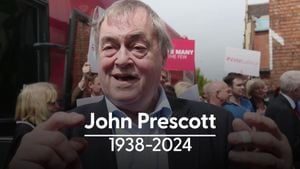Angela Merkel, the former Chancellor of Germany, has recently released her memoir titled Freedom: Memories 1954-2021. This much-anticipated autobiography delves deep not onlyinto Merkel's personal history but also her experiences as one of the world's most significant political leaders over the past two decades. With insights ranging from her childhood under East German dictatorship to her complex relationships with renowned figures such as Donald Trump and Vladimir Putin, Merkel's reflections provoke much discussion on her legacy and the global political climate.
For the first time, readers can gain intimate access to Merkel's thoughts and feelings during her influential sixteen-year tenure as Chancellor. The memoir captures notable moments and decision points, shedding light on her leadership style and the choices she made when faced with international crises. With international relations becoming increasingly strained and tumultuous, her perspective offers both clarity and depth.
One of the most discussed aspects of Freedom involves Merkel's recounting of her challenging interactions with former U.S. President Donald Trump. Their relationship was fraught with tension, characterized by misunderstandings and conflicting political ideologies. Merkel reflects on their infamous first meeting, where Trump famously refused to shake her hand, leading to what she described as, "an uncomfortable and defining moment". This incident is emblematic of the broader disconnect between their approaches to governance, as Merkel often found herself translating peaceful diplomacy against Trump's more emotional and transactional perspective.
Merkel candidly states her surprise at how differently Trump perceived international relations compared to traditional diplomatic norms. She writes, "We were talking on two different levels. Trump approached everything as if it were about real estate – it’s one transaction after another, with no regard for the longstanding relationships being sacrificed along the way." This reflects her view of Trump as lacking the sensibility required for global leadership, where cooperation and consensus are pivotal.
On another significant note, her memoir also examines her dealings with Russian President Vladimir Putin. Recapping their initial encounters, Merkel describes Putin as guarded and intimidating, especially during the 2007 Munich Security Conference, where he brought along his large dog, famously setting off Merkel’s phobia of dogs. This encounter highlighted not only Putin's awareness of how to exert psychological pressure but also Merkel's persistent efforts to engage with him on political matters. She narrates how, during their interactions, Putin would often arrive late to meetings, adding to the strain of their relationship. “It was childish, but let’s face it, he understood the impact of such actions,” Merkel remarked, emphasizing the nature of their diplomatic exchanges.
One of the more controversial topics brought forward is Merkel's cautious stance on Ukraine's NATO membership. She candidly discusses her hesitance during the 2008 Bucharest Summit to fast-track Ukraine’s affiliation with NATO, explaining her belief at the time: “Only a minority of Ukrainians supported NATO membership, and it was important for us to maintain stability.” Critics of her position argue this reluctance may have contributed to Russia's aggressive posture toward Ukraine, leading to the current conflict.
Another preeminent theme throughout Merkel's memoir is the comprehensive advice she sought from unexpected quarters, including her consultations with Pope Francis amid the turmoil of Trump's presidency. Merkel recounts asking the Pope how to navigate diplomacy under such unconventional conditions. His advice – "bend, bend, but make sure it doesn’t break" – proved pivotal as Merkel attempted to balance her principles with the realities of negotiating with Trump, who had announced the intent to withdraw from the Paris Agreement on climate change.
Within these reflections, Merkel emerges as both self-aware and analytical, frequently evaluating her decisions with hindsight. For example, she fervently criticizes Trump's transactional view of international politics as it contradicts her own dedication to human rights and democracy. Merkel's memoir articulates her commitment to multilateralism, fostering alliances, and addressing collective threats, which sharply contrasts with Trump's “America First” outlook.
Although Merkel’s political choices have come under fire from various quarters, especially as Europe grapples with the long-term consequences of her policies, she stands firm on the principles she espoused during her leadership. Her memoir provides not only her insights but also serves as her platform for clarifying her rationale behind key decisions. She articulates, "Every choice I made was aimed at fostering stability and preventing chaos, even when those decisions faced criticism." Her insightful clarity encourages readers to understand the tremendous challenges she navigated as the leader of Germany during tumultuous times.
Finally, Merkel's expression of hope for future leaders shines through her narrative. She expresses optimism about Kamala Harris's potential as the first female Vice President of the United States, whom she sees as emblematic of progress toward more inclusive governance. Reflecting on the significance of her ascent, Merkel believes Harris could bring new perspectives to American politics, countering the divisive rhetoric observed during Trump's presidency.
Merkel's memoir does not shy away from acknowledgment—of mistakes made, lessons learned, and legacy debated. It’s evident throughout her writing, particularly when she confronts her critics. For example, her dealings with the refugee crisis during her regime, often cited as the catalyst for rising populist sentiments across Europe, reveal her internal wrestling between empathy and political consequences. Merkel articulates regret yet emphasizes the importance of humanitarianism as central to her convictions, underscoring the delicate balance leaders must navigate.
With the impending release of Freedom, discussions about Merkel’s political legacy are set to reignite, especially amid the current challenges confronting Europe. The memoir invites both supporters and detractors to reconsider the nuanced mechanisms of leadership, alliances, and the complex interplay of global politics. It is, at its core, more than just personal history; it is a reflective examination of how one leader's decisions resonate on the world stage.



